Broadway in a Year of Reckoning
Molly Ringwald recently wrote in the New Yorker that when she re-watched the John Hughes films in which she starred, she was “taken aback by the scope of the ugliness,” seeing them now as "racist, misogynistic, and, at times, homophobic." Responding to this idea, comedian Bill Maher replied, "You can’t blame someone for not being woke thirty years before woke was a thing,” speculating that “you are tolerating things now that you’ll cringe at in twenty-five years: putting old people in old age homes, mass incarceration, beauty pageants, how we treat animals.” Any "music, TV, or movies from back when," Maher continued, will contain "something we just don’t do anymore.”
Much the same debate is happening among theatre lovers. The matter is less abstract, though, when it comes to live theatre rather than old movies or TV shows. You can view a movie whenever you want, but it exists in a past that you cannot alter. Live theatre may be evanescent, but it is always of the moment; it routinely brings the past into the present, and it can be altered from production to production. What, then, is the responsibility of theatremakers towards live shows that either were created or are set in the past?
...we as a society are engaged in a reckoning with a range of stubbornly antiquated values...
The most visible focus of the question in theatre, as expressed in articles in the New York Times and American Theatre Magazine, has been on two musicals in the Broadway season just past—Carousel and My Fair Lady—and two shows scheduled for the season ahead—Kiss Me Kate and a stage adaptation of the movie Pretty Woman. Conversation has mostly focused on these shows in light of the current #MeToo movement, which sprang up last October in the wake of accusations of sexual harassement and assault against producer Harvey Weinstein.
But our current age of reckoning goes beyond that one issue, to gun violence (#NeverAgain) and racism (#BlackLivesMatter); indeed, we as a society are engaged in a reckoning with a range of stubbornly antiquated values that don’t (yet?) even have a #hashtag. The following is a look at some shows from the recently ended Broadway season, which gives a glimpse into a variety of ways that theatre handles the past.
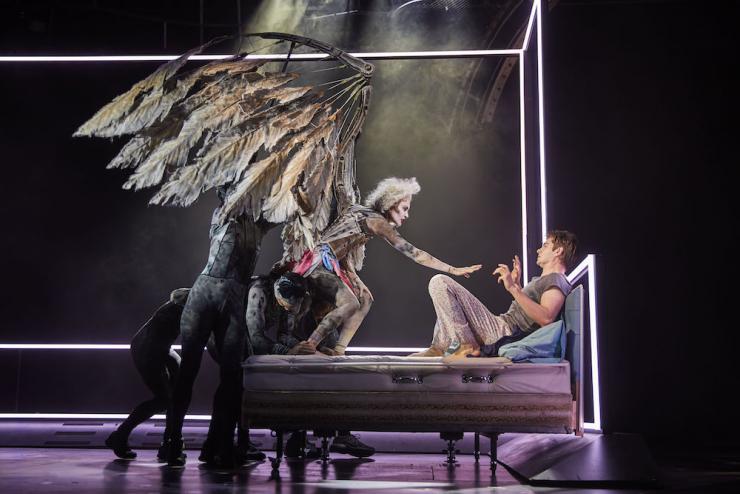
Angels in America
Written in the midst of the AIDS crisis, just a few years after it’s set, Tony Kushner’s epic play has become a period piece now. The epilogue, where the character with AIDS is defiantly alive, was making a political statement for 1990, when AIDS was still widely viewed as a death sentence. It’s interesting to note how newly relevant many of its concerns are, including immigration, climate change, race relations, political corruption, LGBT discrimination, and, especially, the inequity of health care.
The current Broadway production features few noticeable alterations to the script, but I did detect some subtle adjustments. When the police call Hannah, Harper’s mother-in-law, to report that they have her in custody, we hear Hannah say now: “She’s not insane, she’s just bewildered.” In the original production, Hannah said “….she’s just peculiar.” The change doesn’t get a laugh (as the original did), but it paints Hannah as more compassionate and even worldly. Is it a stretch to see this as reflecting our current era’s more enlightened view towards mental illness?
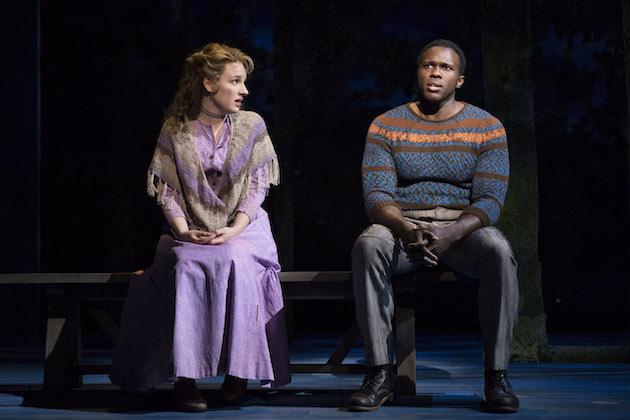
Carousel
Carousel, Rodgers and Hammerstein’s second hit musical after Oklahoma!, adopted from the Hungarian play Liliom, has an extraordinary score and a troubling plot. Billy Bigelow, a carnival barker in Maine, starts off as a kept man, bossed around by the carnival’s widowed owner Mrs. Mullin. Then Billy meets a millworker named Julie Jordan, they fall in love instantly (both lose their jobs), get married quickly, and….he hits her.
One might argue that people were tolerant of domestic abuse in the era in which the characters lived, the turn of the twentieth century, but that the show, created half a century after it is set, wasn’t endorsing his violence. Quite the contrary, his hitting his wife (and later his daughter) are the sins for which he’s given the chance to redeem himself, in a hokey plot development involving intercession by the Starkeeper, a kind of guardian angel a la It’s A Wonderful Life. Yes, Billy’s views are essentially sexist, (“You can have fun with a son,” he sings in Soliloquy, “But you’ve got to be a father to a girl.”) but does that mean his creators were?
The biggest problem with that argument is the character of Julie Jordan, who is not just resigned to Billy’s abuse; she rationalizes and even justifies it (“it is possible, dear, for someone to hit you—hit you hard—and not hurt at all”….a slap can feel like a kiss, etc.) Julie is supportive of Billy, but more to the point, the character seems to exist largely as a supporting player—she’s Billy’s victim so that Billy can redeem himself.
In the sixth Broadway production of Carousel, director Jack O’Brien presides over Justin Peck’s re-imagined athletic dances, Santo Loquasto’s eye-catching new set design, and Jonathan Tunick’s lush new orchestration. But there is little discernible change to Julie’s words or her demeanor, as performed by Jessie Mueller. This is especially cringe-worthy since Mueller’s two previous, star-making roles on Broadway, in Waitress and Beautiful, were both about women (one fictional, one based on fact) who escaped from abusive relationships.
The casting of Joshua Henry as Billy makes sense in terms of his talent—his singing is extraordinary—and at first glance it might seem a kind of reimagining of the show, because the performer is African-American. It would have been possible to have a black carnival barker in early twentieth century America, and the alteration could bring fresh perspective to the story (adding a resonance to the dynamic with his boss, perhaps). But shortly after Henry first appears on stage, another black actor follows, portraying a police officer. Since it’s unlikely for there to have been a black police officer in a coastal town in Maine in 1900, this seemed the director’s clear signal to the audience that we’re meant to see the casting as color-blind rather than color-conscious. It struck me as a safe way of acknowledging the present reality of theatre without affecting the world of the past in the play.
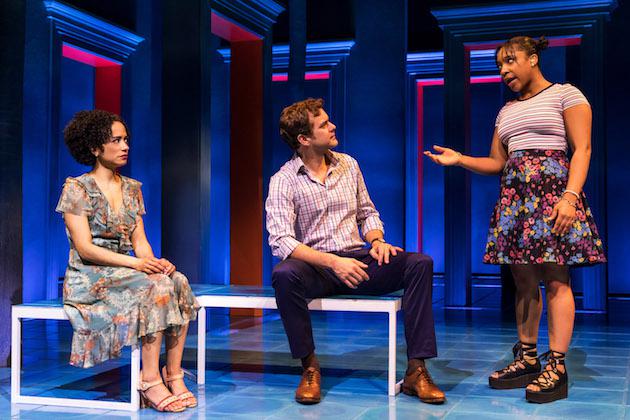
Children of a Lesser God
There is a scene in the first Broadway revival of Children of a Lesser God in which the hearing teacher James Leeds (Joshua Jackson) has to speak on the phone so that his Deaf wife, Sarah (Lauren Ridloff), could communicate with a Deaf student on the line. That scene made sense when Mark Medoff’s play debuted in 1980. Technology has rendered it obsolete—e-mail, texting, and Facetime now enable Deaf people to talk directly to one another without a third party. The creative team decided to keep the scene, making the show a period piece. But that’s not the only way the play is dated. There has been a change in cultural attitudes towards the Deaf and, for that matter, towards women. Yet the play is told entirely from James’s perspective. He literally speaks for Sarah, saying in English what she’s signing in American Sign Language.
Director Kenny Leon and the others responsible for mounting this forty-year-old play essentially ask us to overlook the out-of-date Deaf politics and sexual politics in Children of a Lesser God. They argue that the play explores universal and timeless themes about listening and making connections. But is it timeless enough to compensate?
There is one way in which Children of a Lesser God is more up to date than any other show on Broadway: it’s more accessible, with open captions at every performance, regular ASL interpreters, and Galapro, an app that you can download on your own smart phone that provides captions in real time.
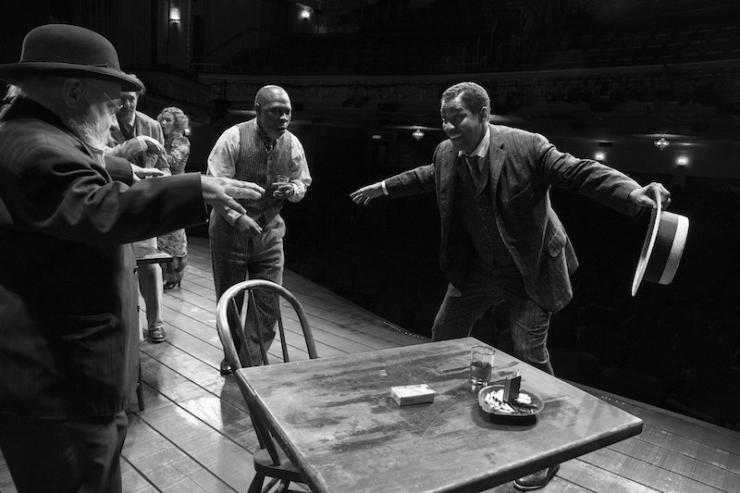
The Iceman Cometh
As in the current Carousel, the fifth Broadway production of Eugene O’Neill’s play includes some African-American actors, but here it is even more complicated. Michael Potts portrays Joe Mott, a black character who is the target of the casual racism of his fellow barflies. But Denzel Washington’s character, Hickey, experiences no such racism, because (as the audience understand immediately) this is an example of color-blind casting (or, more accurately, star-casting).
Joe is a sympathetic character—or at least as much as any of O’Neill’s drunken delusional losers who hang out at Harry Hope’s bar can be. It’s harder to say the same of the five women characters in the play, two of them off-stage. The three we see are all prostitutes, while the two off-stage are spoken of as too upright (albeit in very different ways), and punished for it. The old Madonna-whore complex; O’Neill seems to buy into this view of women, and director George C. Wolfe doesn’t do anything to convince us otherwise. Maybe there is nothing he can do.
In an effort to make the past more palatable to present-day audiences, is it all right for theatremakers to rewrite history?
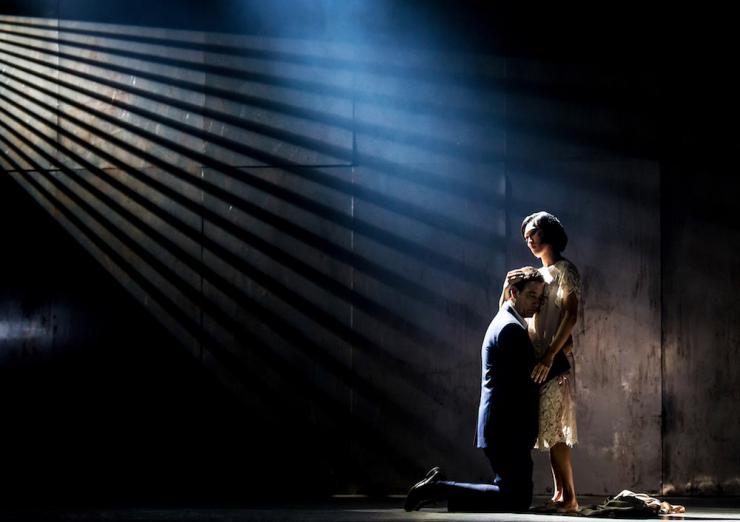
M Butterfly
In the original production of David Henry Hwang’s M Butterfly in 1988, the first play on Broadway written by an Asian American playwright, the audience didn’t learn that the Chinese opera star and spy is male until the actor playing him, BD Wong, stripped naked. In this season’s revival of the play, we were told right away.
I thought this allowed the audience a distance from the Western characters that encouraged us to feel superior to them rather than (as in the original) complicit with them. I wondered why Hwang rewrote his play so much. In part this was surely because the true story on which it is based is well-known now, so there was less incentive to try to spring surprises; I think in part this was because public attitudes have become more sophisticated towards such concepts as gender fluidity. But I suspect the main reason was because of how much new information has come out about the story since the play was first produced. In books on the subject, journalists revealed how the spy managed to deceive the French diplomat for all those years, and audiences now learned about it in the play’s updated courtroom scene: he manipulated his penis to resemble a “shallow” vagina during sex. If something felt lost by turning what was elusive and mystical into something so graphic, M Butterfly 2.0 was also a useful lesson in how the past, never completely graspable, can change on you.
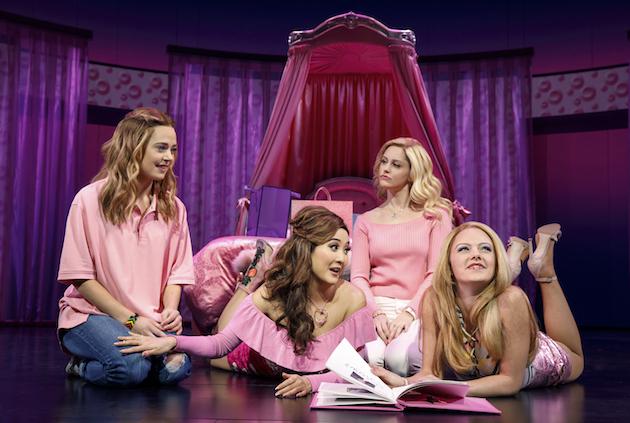
Mean Girls
Mean Girls, a new musical based on Tina Fey’s 2004 movie, attempts to soften the cruelty of (and towards) its high school characters by concluding with a series of moral lessons about kindness and female empowerment. Kate Rockwell portrays the comically dumb blonde Karen Smith, for example, who offers some sharp insights near the end, which is surely intended to make us feel better about all the jokes made at her expense beforehand.
But I was particularly taken aback by the monologue that math teacher Ms. Norbury addresses to the female students in the school:
…one thing I know for sure, guys, is that calling someone ugly doesn’t make you better looking. Calling someone stupid won’t make you any smarter. And we have to stop beating each other up over every little thing, ‘cause meanwhile, men are running around grabbing butts and shooting everybody….
I thought: Did they really just throw in a glib reference to the grave issues of sexual harassment and mass shootings as part of an adolescent pep talk? This made me realize how much I thought Mean Girls ill-timed. At a time when high school students are in the news as survivors of gun violence, and as the leaders (heroes!) of a renewed nationwide protest movement for gun control, do we really need a trivial musical that, for all the facile moral lessons tacked on at the end, reduces teenagers to stereotypes for our amusement?
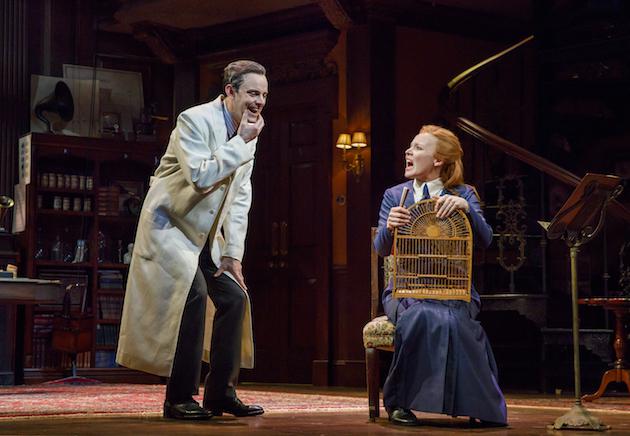
My Fair Lady
Last year, Julie Andrews, the original Eliza on Broadway, was giving an interview on the occasion of her directing the musical in Sydney, Australia. In answer to a question, she replied: “Oh gosh—it is very, very sexist. Young women in particular will and should find it hard.” Yet, although she was tempted to change the ending, she told her interviewer, she left it alone. “You have to remember that this story is set just a couple of years before the rise of the Suffragette movement. Women's rights aren't there yet but emancipation is where she's heading. I firmly believe that.”
Bartlett Sher does change it in the fourth Broadway revival of Lerner and Loew’s 1956 musical, making it clear through a stage direction that Eliza will walk away from Henry Higgins. He also directs the performers to make it clear that their characters have no romantic interest in one another.
One can argue (as I did in my review) that Sher’s changes restore the musical to the original intent in George Bernard Shaw’s play Pygmalion, from which My Fair Lady was adapted, as Shaw explicitly laid out in a longwinded epilogue to his published script. Not coincidentally, they also make the characters more palatable in our #MeToo era.
But the change in tone has baffled or outraged some devotees of this Golden Age musical, who point out that it contradicts the lyrics of such songs as “I Could Have Danced All Night” and “I’ve Grown Accustomed To Her Face.” A colleague wrote a long, angry Facebook post that in essence said: If a director is uncomfortable doing a show as written, don’t do it; “there are loads of other plays and musicals in the world to do.” But why should we give up such beautiful music?
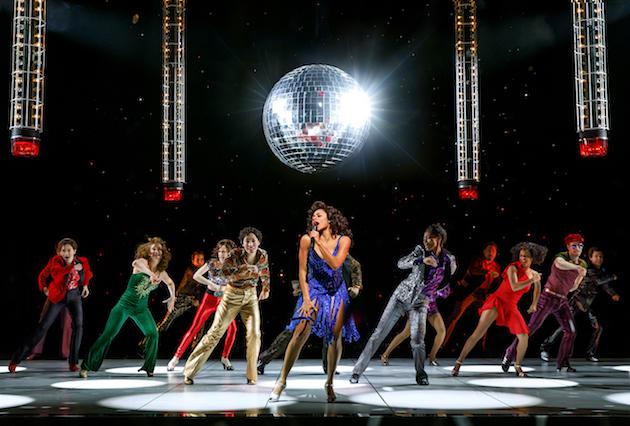
Summer
The cast of Summer, a new jukebox musical about 1970s “disco queen” Donna Summer, is made up of fourteen women and four men. Three of the women portray Donna at different ages—there’s Diva Donna and Disco Donna and Duckling Donna (because as a girl, she thought she was an ugly duckling). The remaining women of the cast portray most of the male characters. This seemed a baffling choice. Men—specifically gay men—were her most devoted fans, and largely responsible for her initial stardom. I started to figure out what I think is going on when the Donnas sing “She Works Hard for the Money,” and then Diva Donna explains she wrote the song about an attendant she met in the ladies room of Chasen Restaurant, and “about a whole generation of women who were paid half of what men made for working twice as hard,” which gets big applause. Perhaps she really did say this. Later in the show, Diva Donna tells us with an embarrassed smile about how at a concert she made a “bad joke” —“God made Adam and Eve, not Adam and Steve.” This leads to her saying to the audience: “God made Adam and Steve and Eve and Louise and everybody else” —another applause line.
But that’s not how others remember it. After becoming a born-again Christian, Summer was quoted in the Village Voice in 1983—the depths of the AIDS crisis—as making a comment at a concert describing AIDS as divine punishment for an immoral lifestyle. She denied making the comment. What followed was a gay boycott, which coincided with the waning of her career.
Is it possible that the creators of Summer are trying to promote Donna Summer as a feminist icon, so as to avoid dealing with her status as a (fallen) gay icon? In an effort to make the past more palatable to present-day audiences, is it all right for theatremakers to rewrite history?
Jonathan Mandell’s NewCrit piece usually appears the first Thursday of each month. See his previous pieces here.

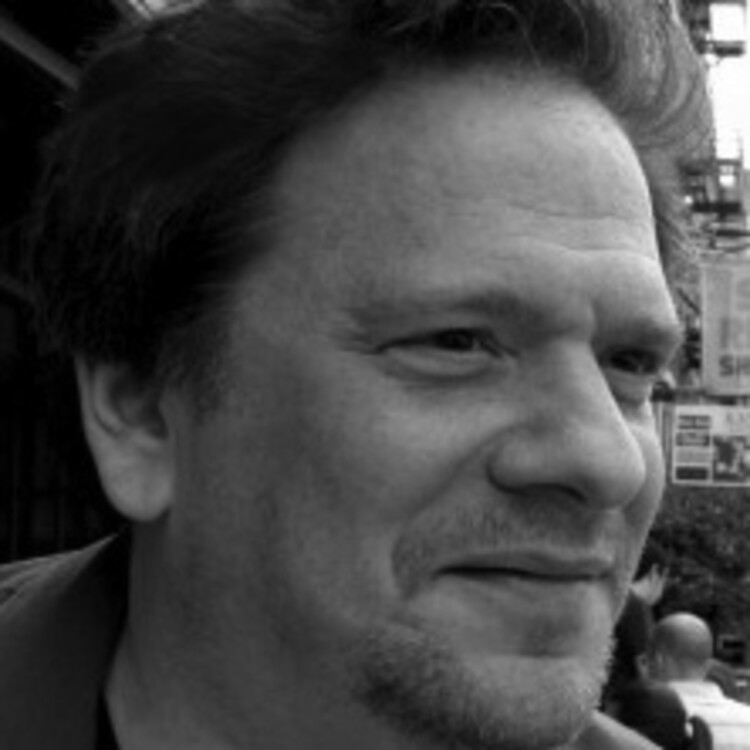
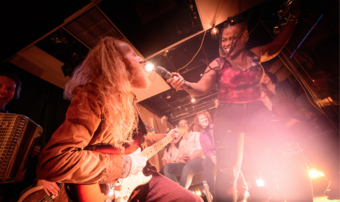

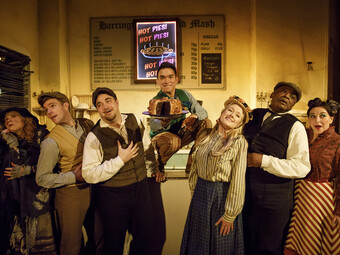

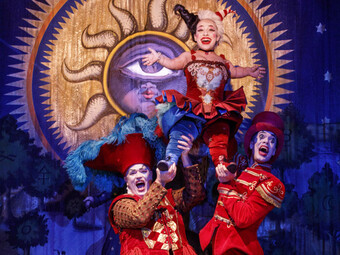

Comments
The article is just the start of the conversation—we want to know what you think about this subject, too! HowlRound is a space for knowledge-sharing, and we welcome spirited, thoughtful, and on-topic dialogue. Find our full comments policy here
This is a very insightful and interesting column and NO i don't think it's okay for playwrights to rewrite history. I loved Donna Summers and still enjoy listening to her music but that does not excuse what she said at the time about gay people. I don't know if she ever sincerely apologized But either way the playwright should have accurately portrayed the controversy and not tried to gloss over what she did... gays made her! What she said at the time and based on my best recollection was a huge betrayal and hurtful.
Well, that's one of the problems with that musical. It's supposed to be a biography of an actual person, but I found I couldn't trust the portrayal.
I think it's worth noting that David Henry Hwang has written a new show with Jeanine Tesori, "Soft Power," inspired by his mixed feelings about The King and I. As he told the LA Times, 'the fact that he was questioning the dated racial politics of the story, Hwang says, “did not preclude me from feeling very moved and still crying at the end.”